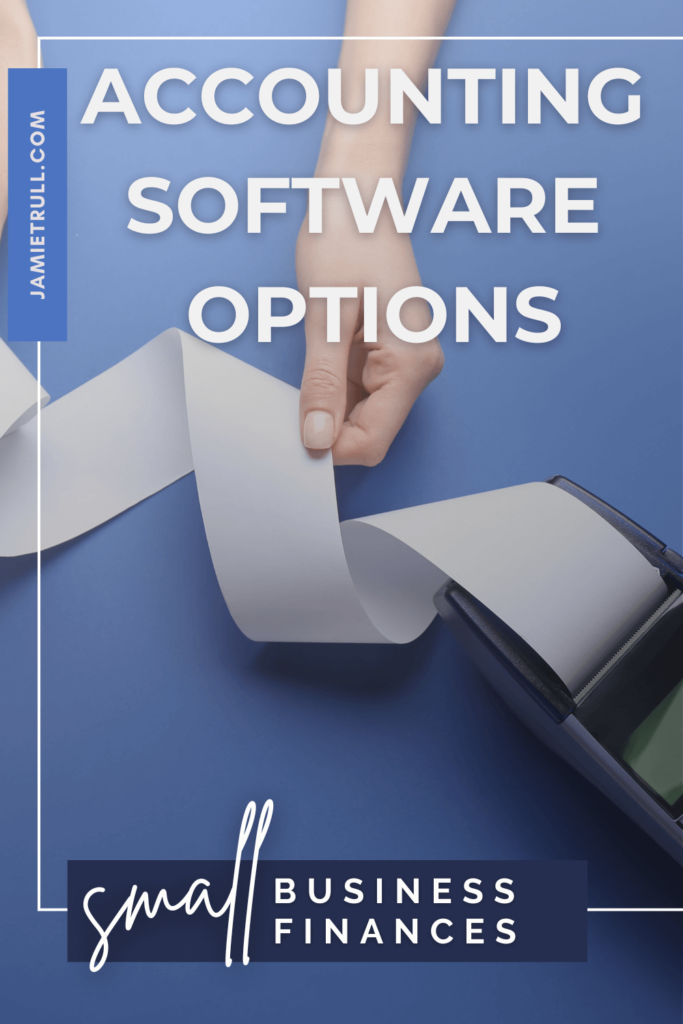
What bookkeeping software for small business owners makes the best alternative to Quickbooks Online?
If you don’t want to use QuickBooks for your accounting software, how do you know which financial tool has the right options for you?
In this post, I’m sharing two of my favorite QuickBooks alternatives, each of which offers a unique approach to small business bookkeeping and accounting.
Whether you’re a solo freelancer, a service-based business, or an expanding team, these QuickBooks alternatives will help you manage your finances in a way that’s affordable and easy to use.
Be sure to check out the recommended tools at JamieTrull.com/Accounting to find the best match for your business.
Should You Use QuickBooks?
Before we dive into alternatives, it’s worth considering why QuickBooks might not be the best fit for your business.
While QuickBooks is powerful and feature-rich, there are several reasons small business owners look for other options:
- Cost: QuickBooks Online pricing has increased significantly in recent years, and many small business owners feel that it doesn’t provide value relative to its cost.
- Complexity: QuickBooks can be intimidating for those without an accounting background, and its interface is sometimes overwhelming.
- Customer Service: QuickBooks support can be inconsistent, especially for small businesses on lower-tier plans.
- Focus Shift: Intuit, the maker of QuickBooks, has shifted its focus toward mid-sized businesses, which means some small businesses find its features and costs aren’t quite as targeted to their needs anymore.
If any of these points resonate with you, it’s worth exploring QuickBooks alternatives that are specifically designed with small business owners in mind.
Here’s a look at some of the best QuickBooks alternatives for 2025.
1. Xero: User-Friendly and Growing with Small Business Owners
Xero Accounting has made impressive strides in recent years, and today it’s one of the best alternatives to QuickBooks for small businesses. It’s a cloud-based platform like QuickBooks Online but has a user-friendly interface and a competitive pricing model.
Why Choose Xero Small Business Accounting Software?
- User-Friendly Interface: Xero is designed to be intuitive, even for people who don’t have a background in accounting.
- Customizable Packages: You can start with a low-cost package and upgrade as your business grows. Xero’s pricing offers more value at its lower tiers compared to QuickBooks Online’s plans.
- Global and U.S. Market Focus: Originally popular in Australia and New Zealand, Xero has recently prioritized U.S. market needs, which is evident in its new features and increased customer support for American small business owners.
- Bank Integrations: Xero seamlessly integrates with a wide range of U.S. banks and credit card companies, which makes managing finances easier and more accurate.
Key Features of Xero
- Bank Reconciliation: Xero offers direct bank integration, making it easy to track cash flow and reconcile transactions.
- Invoicing and Billing: Xero lets you easily create and send invoices, set up recurring invoices, and even track overdue accounts.
- Inventory Management and Project Tracking: Xero has basic inventory management features that allow product-based businesses to keep track of inventory and job costing.
- Collaboration with Accountants: You can invite accountants and bookkeepers to your Xero account, making tax season simpler.
See my special partner discount on Xero and save at JamieTrull.com/Xero
2. FreshBooks: Ideal for Service-Based Businesses
FreshBooks Accounting has evolved significantly and is an excellent alternative to QuickBooks for small service-based businesses, solopreneurs, and freelancers.
It’s specifically designed for businesses with a straightforward income model that may not need the full accounting complexity of QuickBooks or Xero.
Why Choose FreshBooks?
- Project and Time Tracking: FreshBooks includes time tracking and project profitability features, which is perfect for service-based businesses that need to track time and costs associated with each client or project.
- Client-Focused Tools: FreshBooks makes it easy to create professional invoices, track billable hours, and send estimates, all from within the app.
- Cost Efficiency for Service Businesses: FreshBooks is one of the most affordable options for small business bookkeeping. The pricing is simple and affordable, with access to all main features from the start.
- Easy Interface: FreshBooks has a modern, easy-to-navigate interface that is approachable for users who might feel overwhelmed by QuickBooks.
Key Features of FreshBooks
- Invoicing and Estimates: Send professional invoices, set up recurring invoices, and get notified when clients view and pay invoices.
- Expense Tracking: FreshBooks helps you capture all expenses with direct bank connections, which you can easily categorize for tax time.
- Built-In Time Tracking: Track billable hours directly within FreshBooks, making it easy to manage multiple clients and projects.
- Project-Based Profitability: FreshBooks makes it easy to calculate profitability for each client or project by tracking associated costs and time.
Check out the exclusive FreshBooks deals and start exploring this intuitive software at JamieTrull.com/Freshbooks.
Free Accounting Software vs. Double Entry Accounting Software
You don’t have to make choosing the right accounting software for your small business complicated or costly.
Consider one of these fantastic alternatives for the best fit for your business,.
Whether it’s Xero for an intuitive, scalable platform, or FreshBooks for service-based businesses, you have options to fit your needs and budget.
Check out JamieTrull.com/Accounting to explore all these options, use our decision tree, and discover the exclusive deals available right now. Empower your business with the right financial tools as you head into 2025!
This post may contain affiliate links, which means I may earn a small commission if you make a purchase through these links at no additional cost to you (in fact, using our links can typically SAVE you money). We appreciate you supporting our small business by using our links!
This transcript is a direct copy from the video and has been formatted for readability. None of the original words have been altered.
To quote a great poet of our generation, Miss Taylor Allison Swift, it’s been a long time coming. And by that, I mean my recommendation video about QuickBooks Online alternatives. I’ve done tons of content over the years on QuickBooks Online, and let me tell you, y’all have some feelings. I get so many different comments about frustrations with QuickBooks or requests for alternatives for various reasons, and I hear you.
For months, I’ve been digging, researching, demoing, and talking to companies to really understand what else is out there for 2025. Years ago, I did similar research, and unfortunately, nothing could truly compete with QuickBooks Online back then. But today? It’s a different world, and I’m impressed with the updates and features from some of these companies. QuickBooks now has competition.
While I’m still a QuickBooks user and affiliate for now, I want to give you alternatives in case QuickBooks Online isn’t the right fit for you.
If we haven’t met, hi, I’m Jamie Troll, CPA and financial literacy coach. I’m here to provide you with tools to be informed, organized, and profitable in your business finances. Please like and subscribe, and stick around until the end of this post where I’ll share tips on saving money on these accounting platforms.
Recommendation 1: Xero
That’s Xero with an X, not a Z. In my digging, Xero stood out as the most comparable option to QuickBooks Online in terms of features and functionality.
What Makes Xero a Great Option?
- Full Features: Like QuickBooks Online, Xero offers robust reporting, inventory tracking, project management, and more.
- User-Friendly Design: Xero’s interface is intuitive and less overwhelming than QuickBooks, making it easier for new users.
- Scalability: You can start with a lower-priced plan and upgrade as your business grows, ensuring you only pay for what you need.
- Focus on Small Businesses: Unlike QuickBooks, which is increasingly targeting medium-sized businesses, Xero is prioritizing small business owners in the U.S.
Xero started in Australia, where it’s hugely popular, but for years lacked features for the U.S. market. Now, Xero has focused on U.S.-specific needs and is actively attracting small businesses. Meanwhile, QuickBooks is raising prices and focusing less on smaller clients.
Inside Look at Xero
When you log into Xero, you’re greeted by a clean, informative dashboard showing key financial insights. Key features include:
- Business Tab: Manage invoices, online payments, quotes, bills, and purchase orders.
- Bank Integrations: Xero integrates directly with most banks, simplifying reconciliation and reducing errors.
- Projects Tab: Perfect for service businesses, this feature tracks time, costs, and profitability for individual projects.
- Contacts Management: Keep track of customers, suppliers, and other key contacts all in one place.
Xero has even improved its reconciliation process and is rolling out AI features to make accounting even easier.
Pricing and Deals
Xero offers better value at its lower tiers compared to QuickBooks, and it’s subscription-based like most modern accounting platforms. If you’re ready to explore Xero, use my link JamieTrull.com/Xero for the best deals. Currently, you can get 75% off for six months when signing up through my link.
Recommendation 2: FreshBooks
I’ll admit, this one surprised me. Years ago, I recommended clients move away from FreshBooks because it wasn’t a full accounting system. It lacked double-entry bookkeeping and couldn’t generate a balance sheet.
Why FreshBooks is Worth a Second Look
FreshBooks has undergone major improvements, making it a great option, particularly for service-based businesses such as solopreneurs, freelancers, and small teams.
- Double-Entry Bookkeeping: FreshBooks now supports true accounting with journal entries, custom charts of accounts, and balance sheets.
- Cost-Effective: FreshBooks is generally more affordable than QuickBooks or Xero.
- Service-Focused Features: Time tracking, project profitability, and proposal tools are seamlessly integrated.
- All Features at All Levels: Even the lowest-priced plan includes robust capabilities, unlike QuickBooks, which reserves features like project tracking for higher-tier plans.
FreshBooks isn’t ideal for product-based businesses or those needing complex inventory management. But for simple, service-based businesses, it’s a fantastic choice.
Pricing and Deals
FreshBooks grows with you—your costs increase as your client base grows, rather than charging more for advanced tools. If FreshBooks sounds like a fit, check out JamieTrull.com/Freshbooks for the latest deals.
What If You Only Need a Simple Solution?
Not ready for a full accounting system? Sometimes, a well-structured spreadsheet is all you need. If that’s the case, my Profit and Loss spreadsheet might be perfect for you. Check it out at JamieTrull.com/profitloss.
How to Choose the Right Accounting Software
- Understand Your Business Needs: Service-based vs. product-based businesses often have different requirements.
- Evaluate Your Budget: Consider both upfront and long-term costs.
- Identify Key Features: Make a list of must-haves like project tracking, reporting, or integration with other systems.
- Try Before You Commit: Take advantage of free trials or special offers to see which platform feels right.
For a detailed comparison of QuickBooks Online, Xero, and FreshBooks, visit JamieTrull.com/Accounting.
Final Thoughts
With Xero and FreshBooks stepping up, 2025 is a great time to evaluate whether QuickBooks Online is still the best fit for your business.
- Learn more about Xero: JamieTrull.com/Xero
- Explore FreshBooks: JamieTrull.com/Freshbooks
- Check out my Profit and Loss Spreadsheet: JamieTrull.com/profitloss
Let me know which platform you’re considering in the comments. Don’t forget to like and subscribe for more business finance tips!
If you still have questions about choosing an accounting system for your business, check out these related articles:
